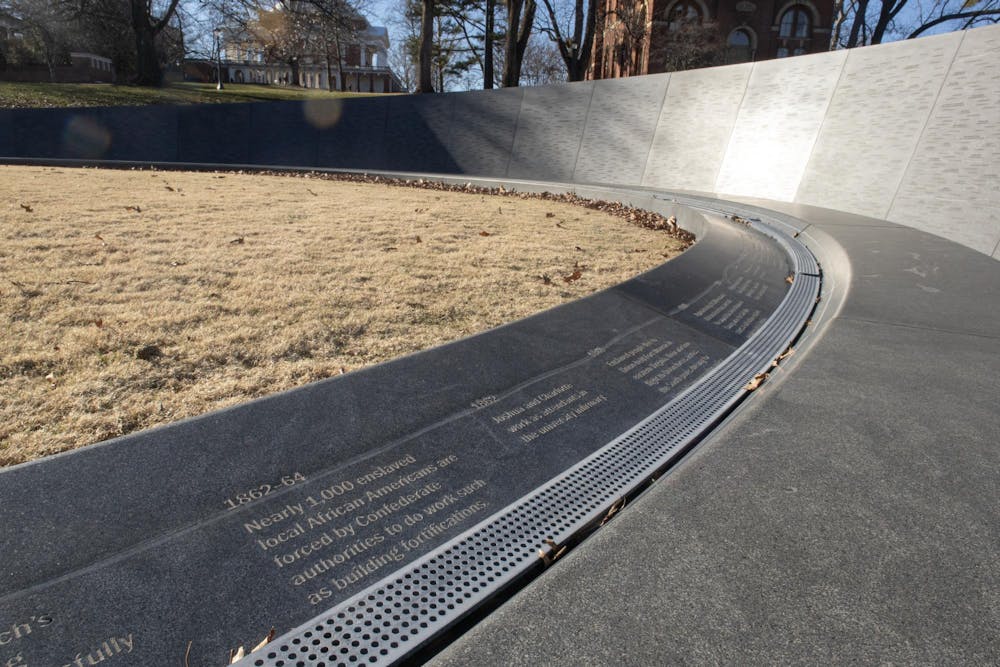We are currently in the middle of Black History Month, a time celebrating the accomplishments Black Americans have made. Here on Grounds, organizations are hosting events to celebrate such history and beauty. Blackness being celebrated around Grounds is, in part, an attempt to combat the shameful past of this institution which has deep ties to racism, slavery and eugenics. In this way, it is impossible to turn a blind eye — even if the University sometimes does — to the damning history that is ingrained in these Grounds. With the rise of regressive policies like repealing affirmative action and the repression of student-led historical tours, we as students must ask ourselves if the University is doing enough to remain attentive to possible backsliding against progress made thus far.
Black History Month is a time to celebrate accomplishments and barriers broken by African Americans. This month also serves as a space to reflect on the struggles and plight which have impacted the Black community writ large. Especially in the climate, taking this moment of reflection and celebration is greatly important. At this University specifically, Black History Month is a time to reflect on the contested history of Blackness on Grounds.
Everywhere on Grounds, Thomas Jefferson’s legacy can be seen, a legacy which is inextricably linked to a racist slave economy. From the monument that stands at the entrance to the Rotunda, to scholarships, councils and debate societies named after him, his legacy is inescapable. As much as the University praises Jefferson and his values of freedom, the founder of our institution held hundreds of enslaved laborers who never benefited from the fruits of their involuntary labor. But it is not only Jefferson who complicates this University’s relationship with Blackness. Many former, prominent faculty— like President Edwin Alderman — practiced eugenics. The University hospitals originally kept Black patients in basements to hide them from white patients. This history makes it hard to believe that this University’s mission is enshrined in ideals of accessible, diverse education when students, like myself, were left out of Jefferson’s grand scheme for this University.
It should be noted that the University has worked to better memorialize this history. For instance, former president and eugenicist, Edwin Alderman, was removed from the name of the now Shannon Library. Removing the name of a eugenicist who would have ardently rejected admission of students of color is a move in the right direction towards promoting accessible education. Additionally, a memorial for enslaved laborers was built near the Rotunda, honoring the contribution of hundreds who built and suffered for this University. Initiatives like these seek to foster an inclusive environment for Black students on Grounds and are deeply necessary. However, a memorial and a name change are ultimately superficial. They cannot fully counteract the University’s continued valorization of Jefferson nor fully erase the controversial and divisive past soaked into these walls.
Even with changing buildings and new memorials, Black students still feel out of place, and it is not hard to understand why. Less than a decade ago, these Grounds were used for the infamous far right “Unite the Right” Rally. With tiki torches lit and racist chants yelled, we were reminded that a racist history is not as far away as the University portrays. And there is no doubt many Black students and residents of Charlottesville felt threatened. From this event, to a noose being placed on the Lawn a few years ago, it is time this administration finds a better way to make amends with the student body’s voice and create active initiatives.
Indeed, all attempts of superficial amends are futile if the University is unable to contend with its history beyond these performative changes, something which it has recently proven unwilling to do. Consider that last semester the University paused tours from the University Guides Service, tours where Jefferson’s legacy was not necessarily taught in just a positive light. These historical tours provided by students aimed to provide a fuller picture of Jefferson’s history including racism and slaveholding. The continued absence of these tours suggests that the University is unwilling to fully reckon with its history’s impact on students.Ultimately, it is pointless to have initiatives combating racism at this school if it does not push for a more complete acknowledgement of its history as told by independent student tour guides.
As Black students celebrate and attend events directed at their legacy and history, our University — that does not fully acknowledge its own past — complicates any celebration that they put on. If the University wants to move forward, it is necessary that they stop trying to protect their history from scrutiny. As much as I, and so many other students at this University love everything this school has to offer, we are far from fixing its relationship with Blackness. Indubitably, it is time that the University administration engages fully with organizations and policies that teach student-centered and genuine histories of this institution. Without this, efforts — no matter how expensive or how grand in performance — will fall short of what they attempt to achieve. As we engage with the rest of Black History Month, we and our University must find a way to rectify the damning legacy enmeshed in the landscape of Grounds.
Ryan Williams is a senior columnist who writes about politics for The Cavalier Daily. He can be reached at opinion@cavalierdaily.com.
The opinions expressed in this column are not necessarily those of The Cavalier Daily. Columns represent the views of the authors alone.







